WMI's Uganda Loan Program Operations
In January of 2008, WMI issued its first 20 loans in Uganda; by January 2018, WMI had issued over 40,000 loans in East Africa. In just 10 years, WMI had grown from one pilot project loan hub to serving two distinct regions of Uganda (plus Kenya and Tanzania as well). Now we issue approximately 15,000 loans per year and provide training and support to thousands of rural businesswomen.
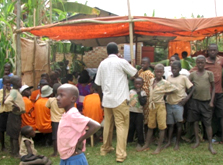
Then: WMI's first venue in Uganda was a makeshift tent in Buyobo.
Uganda is a densely populated country - about the size of Oregon it had a population of nearly 50 million in 2024. It has one of the world's youngest populations: half of the nation is under 15. Nearly 40% of the people live at or below the poverty line (under $1.25/day). There is also dramatic income inequality throughout the society. The country hosts the largest refugee population in Africa - over 1 million displaced persons, mostly from South Sudan and the Democratic Republic on the Congo. The large population and refugee camps strain the country's natural resources.
WMI works in two distinct regions of Uganda.
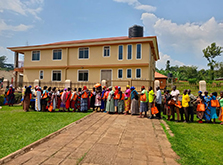
Now: WMI now manages loan program operations from a new a two-story building at its headquarters compound in Buyobo, Sironko District, Uganda.
Eastern Uganda
Sironko, Mbale, Budaka, Bududa, Bulambuli, and Kapchorwa Districts
Established in Buyobo in 2008, WMI's oldest loan hub region is Eastern Uganda, where our headquarters is located and where we established our critically important partnership with the Buyobo Women's Association. This hub routinely provides loans and training to over 2,500 women on a rotating basis.
The PostBank Uganda branch in nearby Mbale town reached out to our leadership and developed into WMI's trusted banking partner, now serving all our Uganda locations through its network of branches.
Our headquarters staff of over 40 local women have been trained to operate this regional loan hub as well provide support to all other loan hub locations in East Africa. Our Local Director, Olive Wolimbwa, and her talented team, have visited all the other WMI loan program hubs in East Africa to provide training and supervision.
Our headquarters compound now hosts an office building, 500 seat pavilion, kitchen, garage and latrines. With our extensive local impact, WMI's operations have improved the general economic conditions in the hundreds of villages we serve in the area.
Each year hundreds of proud businesswomen here attend a ceremony to honor those who are graduating from WMI's two-year, village-level program and moving on to independent banking, self-financing, or WMI's innovative Jumbo Loan facility. These annual celebrations, attended by local dignitaries, honor the hard work and achievement of all WMI borrowers and staff in a very public way.
Children of WMI Borrowers in the Eastern Region have seen their mothers, and the mothers of their friends and schoolmates, empowered through the WMI loan program.
Children imitate what they see: the children in this region have seen their mothers proactively taking steps to build businesses and improve their households. One of the most profound impacts of the loan program is the way women use their business earnings to improve their children's future and the way children of borrowers become empowered. Click on the video and see how the children of Buyobo help their mothers with business and household duties for the benefit of the whole family.
Uganda's breadbasket - Located in the hills of Mt. Elgon, Eastern Uganda is a lush agricultural area near the Kenya border. Sironko District, headquarters for the WMI loan program in East Africa, is about 15 miles from the town of Mbale, and has a large population of about 300,000.
The volcanic soil in the area is rich so many women engage in agriculture; local crops include: coffee, beans, maize, potatoes, melons, cassava, ground nuts and sweet potatoes. This is the traditional home of the Bugisu people, known for their coffee-growing culture. We reach out to rural women in the mountainous regions where coffee is grown and have developed facilities to serve them there. Changing weather patterns mean traditional rainy and dry seasons are becoming less reliable so agriculture-oriented businesses have to stay alert and WMI is helping women connect to critical crop information.
Over time women in the area have evolved sidelines that include adding value to raw products, such as making banana pancakes or mushroom sauce. They also provide services to other farmers like leasing out farm tools. Recently, women have begun to buy land and lease it to other farmers to grow crops. Crop transport is a major issue in the region as roads are poor and ill-maintained and gasoline is extremely expensive. Few people have cars, but motorbikes are popular as are bicycles for getting around locally.
Situated on a main route from Kenya to western Uganda and South Sudan, the ladies in the loan program here take advantage of this central location to distribute their goods over long distance. Some have long-standing agreements with traders going to Kampala, South Sudan, Kenya and as far as Rwanda.
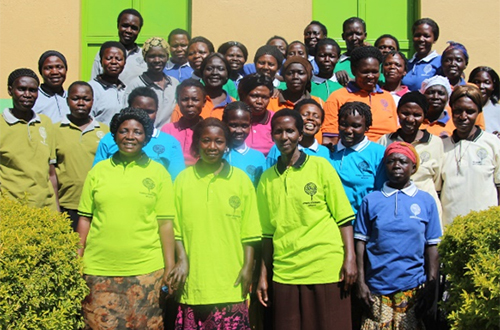
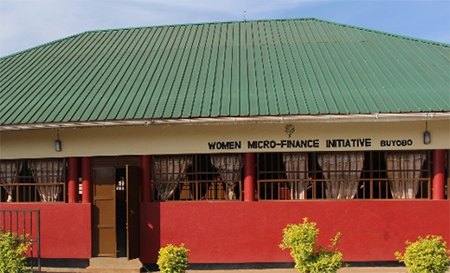
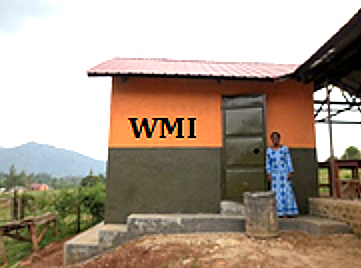
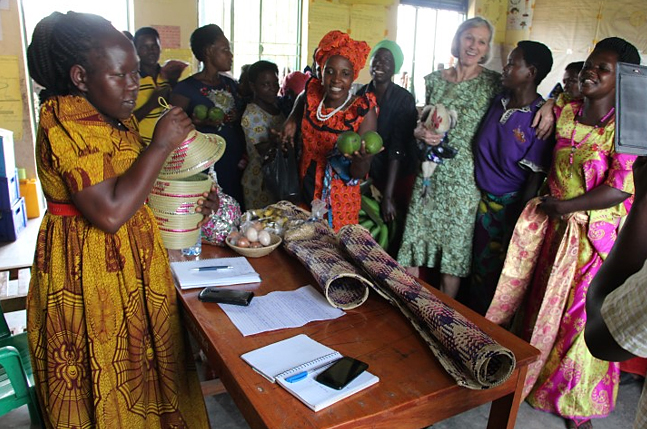
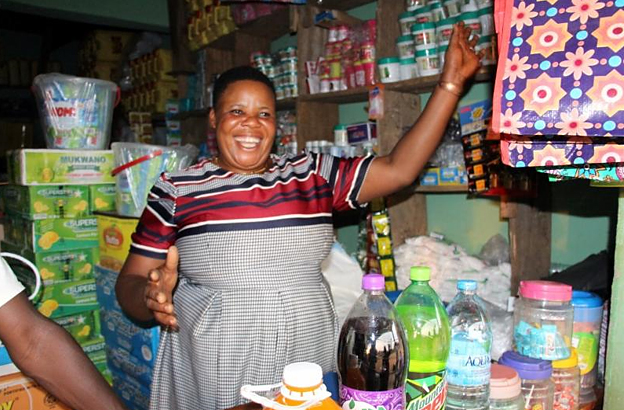
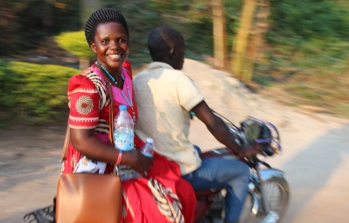
Western, Uganda
Kibaale District
In 2014, WMI began a new partnership with the Buseesa Community Development Centre (BCDC) in western Uganda to expand the small loan program the group had started. That expansion has been a roaring success. BCDC and the four satellites sub-hubs it manages now serve over 2,000 loan program members.
BCDC does not just manage a rural loan hub for women - they also built a primary school and a clinic that provides neonatal care and delivery. BCDC's medical and educational outreach is a significant reason the loan program is a success.
Through our ongoing surveys, we have learned that rural women are vitally concerned about their family's health. They are equally concerned about their children acquiring an education that will lead to career opportunities. Knowing they have access to medical and educational options reduces stress and allows them to focus on their business operations.
The ladies in western Uganda are very savvy about their local markets, inventory pricing, transportation costs, and how inflation affects their businesses. During a visit, a business-owner will more likely than not pull out her account book to show how she is tracking income and expenses.
Businesses here are some of the most successful in the WMI loan program. Owners report earning $100 - $500/month from hair braiding salons, dress design and tailoring, small shops, and sales of maize and beans. Located on a major transportation route, there are numerous trading opportunities.
Many women in the area were refugees from the Rwanda genocide. As children and young adults, they fled violence and chaos. In western Uganda they found stability and a chance for a new life. They persevered by virtue of their own hard work and determination; WMI's outreach helps their businesses expand and thrive.
This region is part of the original home of the Kingdom of Bunyoro, one Uganda's historical monarchies. Kibale National Park in the far west hosts significant chimpanzee populations and still has tracts of swamps and wetlands. The major crop is maize. A new maize mill operated by BCDC is providing women more outlets to sell maize flour and command a higher price for their goods.
Special Projects - In 2019, BCDC undertook an outreach to start a new loan program two hours away with the women of Kyegegwa village. Many of the women there faced physical challenges due to complications from untreated diabetes and they formed a self-help group to support one another. After contacting WMI for assistance in launching a loan program, BCDC agreed to mentor them.
This has turned into an excellent partnership, with the Kyegegwa ladies adding more loan groups and launching more businesses each year. Our platform of expanding loan program operations through peer-to-peer mentoring is making access to financial services a reality for increasing numbers of rural women.
Tour Buseesa - It is remarkable what a busy place a rural village can be! If you have not had a chance to visit one, click on our 90 second video and experience a day in a visit by WMI president, Robyn Nietert, to the western Uganda loan hub.


